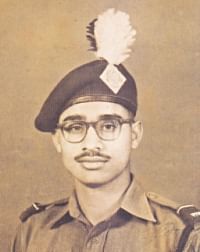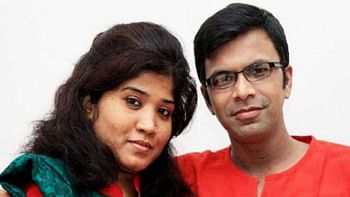Ershad wanted to grab power after Zia killing
President Ziaur Rahman was assassinated in Chittagong on May 30, 1981. Two days later, General Manzur was murdered. Facts related to the planned killing of Manzur show how top military leaders at the time desperately tried to bury the truth behind the Zia killing and how it helped them seize power. Manzur was the unsuspecting victim of their duplicity, which has become evident from the depositions of witnesses and the accused and from some authoritative books on the killing.
All these years since June 1981, justice for Manzur and his family has remained elusive.

The army chief, General HM Ershad, who would seize power on March 24, 1982 by imposing martial law, had wanted to take over just hours after the assassination of President Ziaur Rahman.
He had hinted at it at a meeting with top generals at his office at the army headquarters on the morning of May 30, 1981. The generals gathered there had sought to know from Ershad about the next course of action following the death of the president.
Ershad, however, had found it difficult to proceed with his plan as most of the senior military officers had vehemently opposed him.
"There is no rationale for imposing martial law. The vice-president is there," some of the generals told Ershad, reminding him of the constitutional provision that allowed the vice-president to act as president.
Even as he was planning to impose martial law, Ershad did not inform Vice-President Abdus Sattar about the assassination of Zia until some generals reminded him about the constitutional provision.
In the face of strong opposition to his plan, Ershad along with some other generals went to the Combined Military Hospital to meet the acting president, who was undergoing treatment there.
Sattar was taken to the Bangabhaban from the hospital. A cabinet meeting was held there. And he assumed charge as acting president.
Ershad's desire was thus not brought to fruition at the time.
But a new story started unfolding later.
The presidential vacancy caused by death of Zia was to be filled within the following six months through holding an election.
At his first press conference, Sattar had declared that he was holding the post of acting president for a transitional period and that he would not contest the presidential election because of his ill health.
But an ailing Sattar surprisingly reversed his announcement in less than three days. He indicated that he wanted to contest the election to become the elected chief executive of the government.
Around a dozen ministers, including then Prime Minister Shah Azizur Rahman and those whom Zia had planned to dismiss, became the most active promoters of a Sattar presidency. Knowing the army's preference for Sattar, they only intensified their plan.
The choice of Sattar for the presidency suited both the army leaders and ministers. The reasons were clear.
The army, led by Ershad, had been successful in establishing control over the Sattar-led government. It had compelled Sattar to order the police to hand over Major General Abul Manzur, a veteran freedom fighter, to army custody. Manzur's murder, according to many, buried the possibility of unearthing the masterminds behind the Zia killing.
The way Ershad influenced the acting president over the Manzur issue convinced him and his aides that Sattar was old and infirm and so they would be able to influence him as and when the occasion demanded.
Besides, like Ershad and some other generals dominant at the army headquarters, Sattar had also been repatriated from Pakistan, where he served as Pakistan's chief election commissioner, after the emergence of Bangladesh. Sattar, appointed CEC by the eventually disgraced President Yahya Khan, presided over the general elections which gave the Awami League an overall majority in the Pakistan national assembly in December 1970.
Within a week of Sattar's being chosen as the BNP's presidential candidate, it was discovered that the constitution did not allow him to contest the presidential election as he was holding an office of profit. It was then that the issue of amending the constitution to enable Sattar to contest the election came up.
On July 6, 1981, the leader of the House, Shah Aziz, placed the constitution amendment bill in parliament. But this time around, a large number of BNP MPs refused to cast their votes for the bill.
The BNP had 251 MPs. And for passage of the bill, support of 221 MPs was required. But only 145 BNP MPs were present in the House on the day it was scheduled to pass the constitution amendment bill.
As many as 106 BNP MPs remained absent from parliament on the day. They staged an unprecedented protest, ignoring the party whip about their presence in the House. They were not even worried about losing their membership in parliament under Article 70 of the constitution, which did not allow MPs to ignore the party whip.
The House could not proceed with its scheduled business to pass the constitution amendment bill. The Speaker had to adjourn the sitting to avoid a showdown.
That unprecedented protest by the BNP MPs made Sattar's men nervous. That also created a crisis in the government. At that stage, the army intervened and thus, its support for Sattar was revealed.
"Although we are not yet prepared to take over, if the bill is not passed the army will have no alternative but to do so," Ershad told Moudud Ahmed, who was deputy prime minister in President Zia's cabinet, at a meeting after parliament had failed to pass the constitution amendment bill.
The same night Ershad arranged a meeting at the Bangabhaban between Sattar and the BNP's dissident group. Due to pressure from Ershad, the dissidents finally decided to cast their votes in favour of the constitution amendment bill.
But ensuring presence of large number of dissident MPs in the House again appeared as a challenge. This time around, the ruling coterie put severe pressure on MPs belonging to the dissenting group. Each of the 40 ministers was assigned the specific job of contacting certain MPs who were offered all sorts of temptation. When bribery in terms of cash did not work, other favours were offered; and where none worked, intimidation and threats of lodging false criminal cases were thrown in.
Through questionable means stretching over two days, they managed to get some dissident MPs on their side, but not enough to have the bill passed. Then MPs were warned continuously through newspapers, radio and television that they would lose their seats in parliament if they did not join the session and vote for the bill. Written notices were also sent to all MPs to remind them of this eventuality. Finally, the constitution amendment bill was passed, enabling acting President Sattar to contest the presidential election.
In the run-up to the presidential election, Ershad openly supported Sattar. In an interview with a local weekly, he stated that there was no other political party which could replace the BNP. Throughout the election campaign the army stood by Sattar. It was the army that was his main source of strength.
Sattar won the polls held on November 15, 1981, by defeating Awami League candidate Dr Kamal Hossain by a huge margin of votes.
After the Sattar-led new government began its journey, Ershad began openly demanding a special role for the army in the civil administration within a constitutional framework.
On November 28, 1981 the day after Sattar had formed a 42-member council of ministers, Ershad sent a statement from the army headquarters to editors of national dailies and news agencies to make clear the armed forces' view on the civil administration.
He stated that there must be constitutional provisions to specify the military's role in society. He suggested placing this matter before a presidential committee for in-depth study.
President Sattar was reluctant to proceed with the army chief's proposal. At one stage he even decided to send Ershad into forced retirement. But the decision was leaked to Ershad, who sent troops to the radio and television stations to stop broadcasting the president's decision.
After that incident, Ershad waited only for a few days. On the evening of March 23, military commanding officers met and worked out their plan and strategy for a coup. The Bangabhaban was cordoned off by troops on Ershad's directives that night. And in the early hours of March 24, then BDR chief Major General Atiqur Rahman, air force chief Air-Vice Marshal Sultan Mahmud and naval chief Rear Admiral M A Khan entered the Bangabhaban. They placed a written statement before President Sattar and mounted pressure on him to sign on it and hand over power to the army. But the president was unwilling to sign the statement.
"Make your old haggard understand," Major General Sadikur Rahman, military secretary to the president, had asked Erfan Ali Khan, special security officer of Sattar.
Erfan, a police officer, then went to President Sattar's room and talked to him.
"I agree to sign the statement if some parts of it are deleted," Sattar told Erfan, who then passed on the message to top military officials.
Then they brought about some amendments to the statement which was turned into Sattar's address to the nation. The address was recorded and sent to the radio and television for broadcast. Accompanied by Erfan, Sattar immediately left Bangabhaban for his own residence.
Thus Ershad finally seized power 128 days after the presidential election and 270 days after Zia's death.
[The report has been prepared on the basis of depositions of witnesses in the Gen Manzur murder case and the books, "Silent witness of a General" by Major General Moinul Hossain Chowdhury and "Democracy and the Challenge of Development" by Moudud Ahmed.]

 For all latest news, follow The Daily Star's Google News channel.
For all latest news, follow The Daily Star's Google News channel. 



Comments